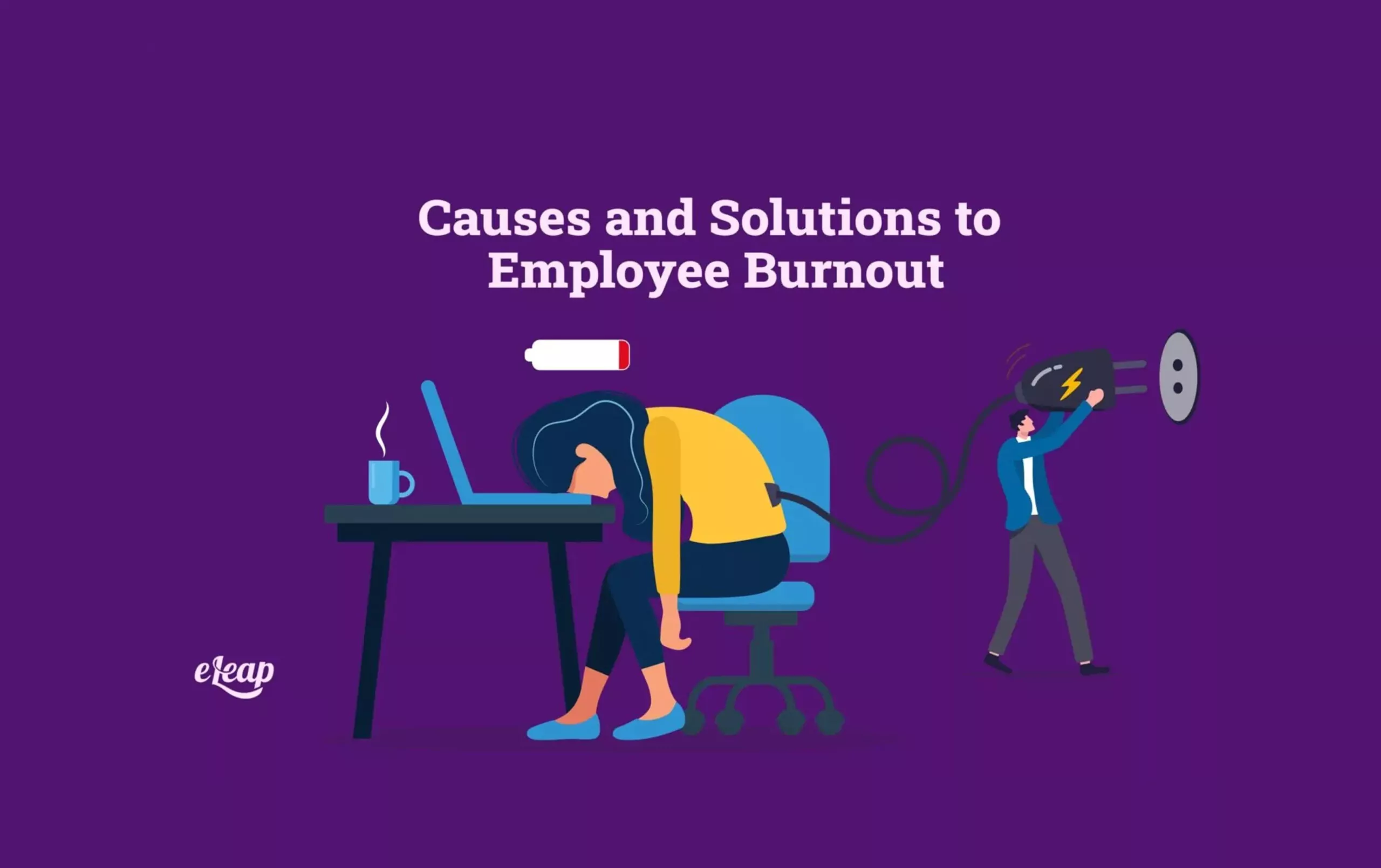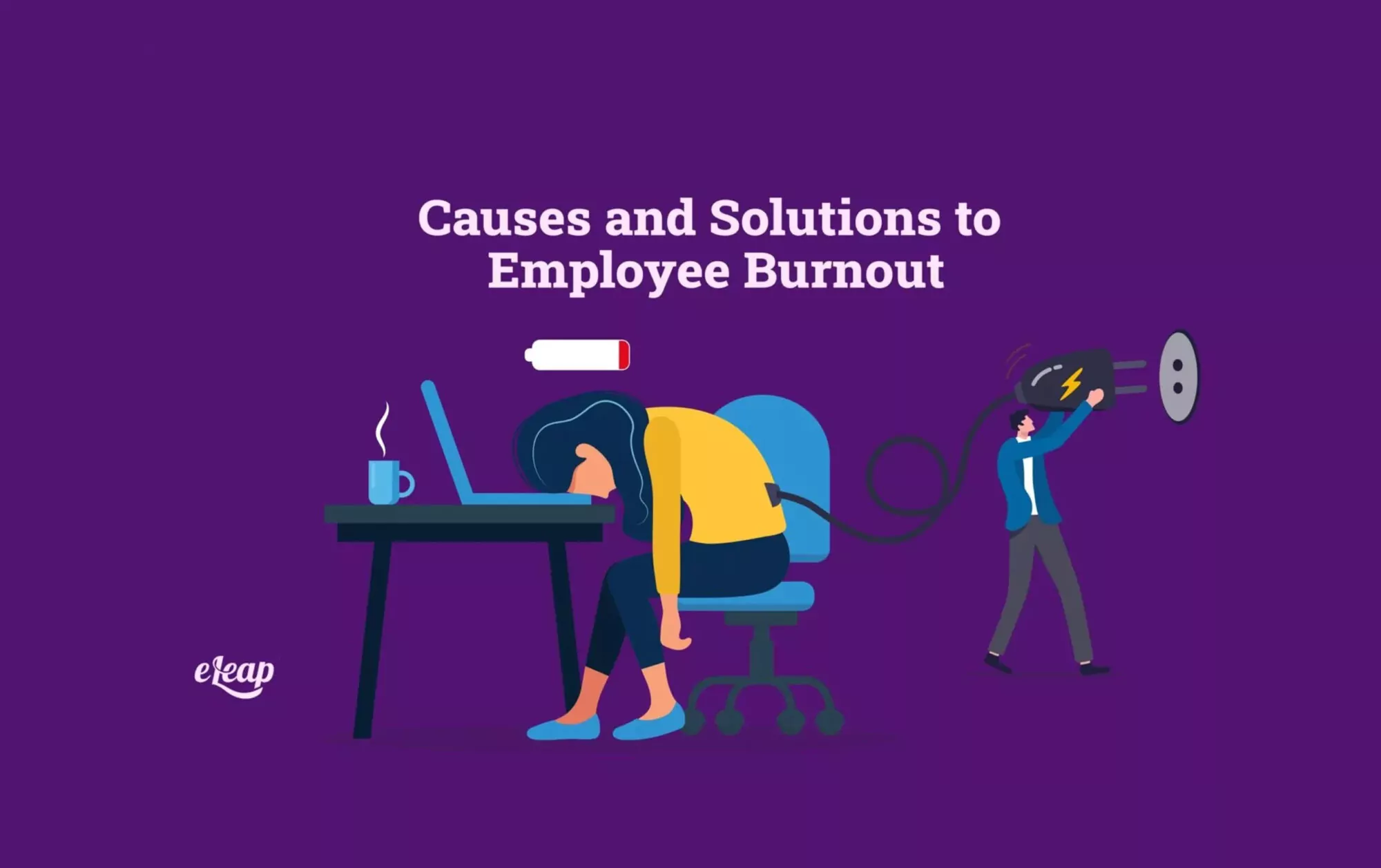Causes and Solutions to Employee Burnout

One of the worst things about employee burnout is that it can take an otherwise positive and vital job role and turn it into a traumatic experience. If this issue isn’t corrected, it could lead to good employees parting ways completely with their current employers. This, however, doesn’t always have to be the case. Explore how eLeaP®’s Performance Management Platform can simplify evaluations, boost productivity, and drive measurable results.
Thankfully, these situations are typically driven by short-term issues that can be solved with long-term solutions. They need to be approached correctly so the employee can understand and engage with them.
Regardless of the reason behind employee burnout, there’s usually a solution to each issue. Let’s examine some of the most specific causes of employee burnout and the solutions to them.

1. They Feel Like Their Progression Has Halted
This would be enough to burn anyone out, right? When you feel like your progression as an employee has ceased to exist, it makes your reason for filling that position somewhat pointless. Many of us identify substantially with our jobs.
Feeling stuck at any point in life can cause burnout, and your place of employment is no different. The yearning to grow and become better is burnt into our DNA. Naturally, when we feel this has been halted, it can cause a burnt-out feeling.
Even though most people try their best to separate their business and personal life, at some point, the overlap is inevitable. We all have individual goals that, ultimately, our professional life will help us achieve. When we don’t meet these personal goals, we tend to look towards our professional lives as the culprit for our lack of success.
So, what’s the solution?
Asking employees to provide insight regarding personal experiences and journeys can offer a great solution. Understanding that someone else overcame the same challenges makes us feel more human. Realizing that you have other people who share your struggles can make all the difference in the world.
2. Losing Sight of the Simple Things
Sometimes, we forget the simple things that drive our daily positivity. It’s a given that we will set personal goals and sometimes not hit them. There’s also no way to avoid particular hang-ups at work and times when we might underperform.
It’s easy to lose sight of the simple things during these struggles. Sometimes, it’s essential to remind peers of the basic things that got them into their jobs.
Reminding someone that their skills are needed or that they’re a vital part of an organization becomes essential occasionally. No matter how long someone has been employed, it never gets old hearing “great job.”
3. No Teamwork/Collaboration
One of the biggest reasons people thrive working for corporations is the teamwork and collaborative environment. Many people in the corporate world could most likely go into business for themselves.
However, there would be a lack of teamwork and collaboration that can’t be duplicated anywhere else. When the teamwork or collaboration element doesn’t exist in a workplace environment, it can cause burnout.
When employees feel like they are shouldering too much of the load or don’t have any peers to bounce ideas off of, this can cause a feeling of isolation. In reality, this is what ends up killing certain startups from the start.
It’s important not to lose the elements that made your organization successful. If teamwork is integral to your success, you shouldn’t stray away from these elements.
Use feedback from every portion of your team. This includes managers and employees. This ensures that everyone involved feels like they are a part of the team.
4. Doing Too Much
In any corporate situation, it’s vital that every employee’s Burnout, like the following man, is carrying their weight. In reality, everyone should be shouldering their fair share of the load. The lack of an equal distribution of the heavy lifting causes disdain in the workplace, which isn’t good.
Employees get frustrated when they see that they’re working harder than someone consistently, and there’s no recourse. There’s nothing more irritating than an employee. Burnout slacks off getting recognition for being a valuable part of the team when, in reality, they’re piggybacking off someone else’s hard work.
How do we fix this?
Managers should host team meetings where everyone is expected to give a detailed report on the duties they’ve been performing for the team. Additionally, managers should frequently check in randomly during the workday to ensure everyone pays their due diligence.
5. More Clarity is Needed
What do we mean by more clarity is needed? Employees need direction. There should be clear-cut goals for where your organization is going; employees need to be aware of this.
This helps them to find purpose in the job they do each day. Nobody wants to feel like they are spinning their wheels personally or professionally. Sometimes, employees could just not understand what they’re supposed to be doing. This alone can become very frustrating and lead to a low retention rate.
What’s the solution to this?
Every employee within the organization should have a clear objective and responsibilities that are clear to them each day. Meeting with a manager regularly to discuss objectives and goals can help establish these.
Getting burnt out happens from time to time on the job. However, it shouldn’t be the end of the world when it does happen. It definitely shouldn’t signal to you that it’s the end of your career. Believe it or not, it’s a regular thing.
When things get monotonous, revisit why you began the job in the first place. Analyze your goals and stay plugged in with management and your team. This is the best way to keep things fresh and exciting with a job you’ve been at for a while.